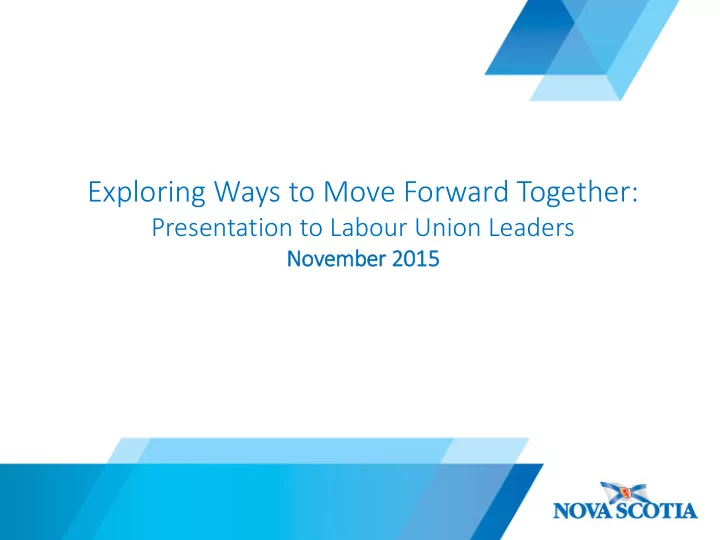

Exploring Ways to Move Forward Together: Presentation to Labour Union Leaders No November 201 2015
Agenda • Welcome and Introductions • Update and Re-cap of August 18, 2015 meeting • Our shared opportunity • Policy goals and objectives • Next steps • Feedback & discussion
WELCOME & INTRODUCTIONS
Update & Recap • At our last meeting, indicated that Government is committed to meaningful collective bargaining to achieve sustainable public services • Openness to innovation, creativity, and new ideas for the benefit of all Nova Scotians and to collaboration leading to “shared gains” for employees • Asked you to engage and undertake meaningful collective bargaining & to bring this information to your leadership and members • And to discuss through action at bargaining table
Recap: Public Service Sustainability Mandate • Applies to all public sector employers whose collective agreements expire on or after March 31, 2014 • Mandate provides employers the ability to negotiate five year agreements with a fixed fiscal envelope consistent with government’s published fiscal plan • Mandate enables employers to allocate some portions of innovative cost savings or cost avoidance — “shared gains” to wage increases in out years of the collective agreement • Shared gains can be any negotiated changes that generate savings — not necessary that savings be from current collective agreement
Worth repeating: Our Fiscal Reality • Government spends about $5.2 billion on compensation. At 52% of total spending, compensation represents the single largest expense of the government • Nova Scotia has had the slowest economic growth in real GDP of any province since 1990 • Nova Scotia’s government expenses have exceeded its revenues in 20 out of the last 30 years • Nova Scotia has a structural deficit
Sin ince We L ast Met… • Limited Progress • Some tables are meeting…but not many • Positioning v. collaborating • Meaningful collective bargaining is challenging
Our Shared Opportunity • Purpose of mandate: • align our interests in collective bargaining processes as much as possible • Common mission – to serve the public and have sustainable public services • Mission cannot be achieved without the engaged participation of unions and their members • Moving to collaboration to achieve common goals
Our Shared Opportunity • US Department of Labor (1996) saw up to 20% productivity improvement from collaborative approach: “Cooperative relationships have reduced costs, improved service, facilitated conflict resolution, reduced grievances, and improved the quality of work life by increasing job security, improving skills and advancement opportunities and raising wages or bonuses”. P122, Strategic Choices in Reforming Public Service Employment: An International Handbook, 2001
Labour Rela lations Envir ironment • Is the status quo working? • Process was designed for a different era
Seeking Your In Input • Is the current model — Wagner Act — working effectively for Nova Scotians? • Does our legislation address recent Supreme Court of Canada decisions adequately? • Are “good faith bargaining” requirements and “impasse resolution processes” effective? • What changes would promote a more collaborative model? • How can we sustain public services given fiscal realities?
Next Steps • Seeking your feedback in writing by November 16, 2015 Email: - financeminister@novascotia.ca Mail: - Department of Finance and Treasury Board, Box 187, 1793 Hollis Street, Halifax, NS B3J2N3 • Invite bargaining agents to continue current negotiations • Public Service Sustainability Mandate (2014-2019) • Remain committed to ongoing, meaningful collective bargaining 12
Discussion
Recommend
More recommend